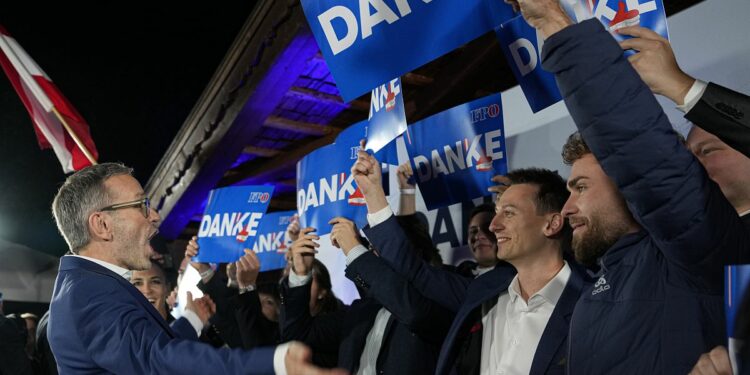“I can’t tell you how happy I am about this result. What we have achieved is beyond my wildest dreams.”
The pro-Kremlin, anti-migration party has capitalised on the voters’ disapproval of the government’s handling of the COVID-19 pandemic and a nosediving economic situation.
But to become Austria’s new leader, Kickl needs a coalition partner to command a parliamentary majority, and that might be tricky.
He has said he is open to negotiating with other parties, but his rivals — including Chancellor Karl Nehammer and Social Democrats leader Andreas Babler — have refused the possibility of working with the far right, turning him down yet again on Sunday night.
On Monday morning, Kickl, who wants to become a “Volkskanzler” or people’s chancellor — an echo of Adolf Hitler’s Nazi propaganda moniker — will have a lot of convincing to do, despite his party’s strong showing.
‘You can’t run a state sensibly’ with Kickl
A projection for ORF public television, based on counting of over 90% of the vote, showed the Freedom Party finishing first with 29.2%.
That win has pushed Nehammer’s Austrian People’s Party (ÖVP) into second place, with 26.5%, seeing the outgoing government — a coalition with the environmentalist Greens — lose its majority in the lower house of parliament. The Social Democrats came in third.
Speaking in Vienna, Nehammer said it was “bitter” that his party lost but his position towards Kickl hadn’t changed.
“I have always said, with Herbert Kickl, who believes in conspiracy theories, who accuses the WHO of being the next world government and the meeting in Davos of being a preparatory meeting for world domination, you can’t run a state sensibly and responsibly with him. And I still stand by that,” he said.
A major question is whether the ÖVP and Social Democrats will align — potentially with an additional, smaller party like the Greens or NEOS — to form an anti-Kickl coalition.
Alternatively, the ÖVP could replace Nehammer with a new leader more amenable to working with Kickl. The conservative party as a whole may prefer a merger with the FPÖ over an alliance with the left.
In 1983, the Social Democrats and the conservatives accounted for almost 91% of the votes. This has now dropped to less than 50%.
The Austrian political establishment’s hefty electoral defeat is the latest example of shifting voting trends across the continent.
ADVERTISEMENT
Recent elections in countries like Germany and France not only show a rise in the far right but also indicate rising resentment with the political status quo.
Populist votes are being snatched by both the extreme left and right as voters challenge the traditional EU centrist-liberal establishment.
Kicking out Kickl?
In its election program, titled “Fortress Austria,” the Freedom Party calls for “remigration of uninvited foreigners,” achieving a more “homogeneous” nation by tightly controlling borders and suspending the right to asylum via an emergency law.
The Freedom Party also calls for an end to sanctions against Russia, is highly critical of Western military aid to Ukraine and wants to bow out of the European Sky Shield Initiative, a missile defence project launched by Germany.
ADVERTISEMENT
Kickl has also criticised what he calls “elites” in Brussels and called for some powers to be brought back from the European Union to Austria.
The Freedom Party’s win sparked protests outside the parliament building in Vienna with demonstrators holding placards with slogans including “Kickl is a Nazi”.
The final official results will be published later in the week after a small number of remaining postal ballots have been counted, but those are unlikely to substantially change the outcome.
Additional sources • AP
Source link : https://www.euronews.com/my-europe/2024/09/30/austrias-freedom-party-secures-first-far-right-election-win-since-world-war-ii
Author :
Publish date : 2024-09-30 10:47:17
Copyright for syndicated content belongs to the linked Source.


